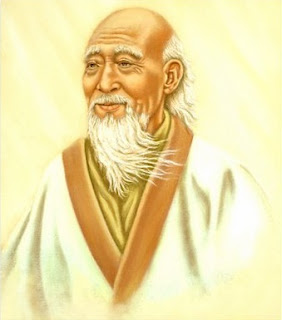Contended to have lived 600 years before Christ and being a contemporary of Confucius (that’s a century before Socrates) and supposed to be, according to some Chinese traditions, a teacher of Gautama Budha or, according to some other traditions, Budha himself; Laozi is one of the three most read poets of the world (other two are Shakespeare and Kahlil Gibran). He is considered as the founder of philosophical Taoism. Taoism is one of five official religions in China (the other four- Buddhism, Islam, Protestant Church, and the Catholic church – the last two are enforced by the government to stay different).
Taoism is a philosophical, ethical or religious tradition which emphasizes living in harmony with Tao (literally - way, path or principle). Although the philosophical thought has nothing theist about it - it is more pantheistic; many deities are often worshipped – including Laozi himself, this despite his teaching that saints should stay modest:
“When the work is done, and one’s name is becoming distinguished,
To withdraw into obscurity is the way of heaven"
What is adorable is its emphasis on soft virtues like modesty,simplicity and naturalness (something missing in so many religions):
"The violent and strong do not die their natural death.
I will make this the basis of my teaching."
My first impression while reading these poems was that of disappointment at the repeated emphasis on the mysteriousness of Tao (it looked like 'Lord work in mysterious ways' kind of thing):
"The Tao, considered as unchanging, has no name."
I mean how can a thing be unnamable? You can easily name anything and didn’t you just call it ‘Tao’? Now that is not bad name!
It took me some time to understand that Laozi is like those Bhakti and Sufi poets who do not want to hear anything argumentive which has to do with what they love and preach others to love - even if it is a good argument. And so knowledge and learning is disclaimed:
"It is better to leave a vessel unfilled,
than to attempt to
carry it when it is full."
"Those who know(the Tao) are not extensively learned; the extensively learned do not know."
Also as Laozi himself says:
“Words that are strictly true seem to be paradoxical”
... there are a lot of paradoxes, but amost of those paradoxes are simply beyond my understanding. Take for example:
“The Tao in its regular course does nothing (for sake of
doing it); and so there is nothing which he does not do”
“He who dies and yet does not perish, has longevity”
“The very essence of Tao lies in its refusal to be defined,
Thus, he who doesn’t understand it, understands it best.”
Okay, I totally made up that last one but I think you get a general idea. Yet, there are other paradoxes that I understood and loved:
“Who loves the large stores
Gives up the richer state”
“The truth is not always beautiful, nor beautiful words the truth."
And there are some simply beautiful sayings:
"The tree which fills the arms grew from tiniest sprout;
The tower of nine storeys rose from a (small) heap of earth;
The journey of a thousand li* commenced with a single step."
"It is simply by being pained at (the thought of) having this disease that we are preserved from it."
"The flame that burns Twice as bright burns half as long.”
“A man with outward courage dares to die; a man with inner courage dares to live."
"If you keep feeling a point that has been sharpened,
the point can not long preserve its sharpness."
 |
| Tao Tzu |
There are some wise observations about statesmanship and leadership– even present-day governments can learn from them:
"“A leader is best
When people barely know he exists
Of a good leader, who talks little,
When his work is done, his aim fulfilled,
They will say, “We did this ourselves.”
I’m definitely going to read more about Taoist philosophy.
"The highest excellence is like (that of) water.
The excellence of water appears in its benefitting all things, and in its occupying, without striving (to the contrary) the low place which all men dislike.
Hence (its way) is near to (that of) the Tao."
Copyright - Sidharth Vardhan
*li = Chinese mile.

Comments
Post a Comment